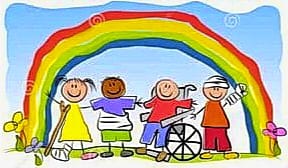Fitness for Special Needs Children
There is no unblemished opportunity to witness the “mind/body” connection then when working with children who are struggling with developmental disabilities. Their actual body awareness, balance, spatial awareness and sustained physical focus goes hand in hand with their mental clarity, ability to complete a task, and emotional control. If teachers, parents and caregivers can focus on increasing a child’s physical balance, strength and coordination, often they will notice a noticeable improvement in their social, mental and emotional development.
When children with special needs are:
- offered opportunities to practice self-regulationthrough special movement games
- encouraged to increase their muscle strength, ability to perform symmetrical movements and achieve balance through yoga poses
- pushed to increase their stamina with sustained gross motor activities
All these activities instill patterning that effects their progress. But not all movement programs are successful for the special needs population.
Here are 5 key points that will help teachers, specialists and therapists along with parents make educated choices when comparing special needs fitness programs for children:
- Curriculum updates– Does the program provide new ideas, and specific activities as this is an evolving field?
- Detailed experience based manual– Is there a comprehensive and easy to follow instructional manual based on actual experience in the classroom?
- Music that balances simplicity with rhythmic stimulation- Sound is often a very sensitive issue for many special needs children. Musical choices should be geared to the needs of the special needs child.
- Movements that discourage flapping, rocking and other movements symptomatic of autistic children- Emphasis on symmetry, smooth movements and activities that teach self-regulation are optimum for special needs children.
- Curriculum should be adaptable – The spectrum of special needs disabilities is so vast that the program should be flexible enough to adapt to children with physical and/or neurological disabilities.
Offering a comprehensive fitness program that is fun while providing those small successes that keep children excited, boosts their self-confidence and promotes a positive self-image guarantees that both kids and staff will look forward to movement time, week after week.
If you like this article and find useful information that will help provide you with the resources and knowledge you need for raising special needs children successfully, would love to hear from you in form of your comment on blog section here.



(3) Comments